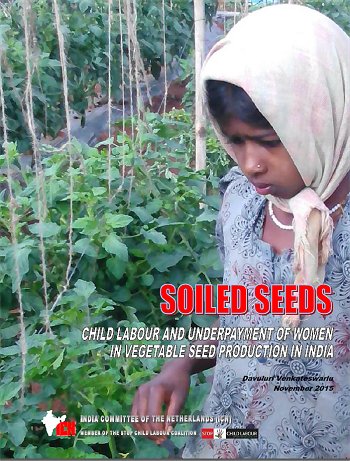By Raqib Hameed Naik, TwoCircles.net
New Delhi: In a shocking revelation, a study has pointed out the grim realities on the use of child labour grim reality in seed-producing companies, along with the non-payment of minimum wages to workers, especially women.
According to study “Soiled Seeds – Child Labour and Underpayment of Women in Vegetable Seed Production in India”, conducted by Dr. Davuluri Venkateswarl, almost 1.56 lakh Indian children are producing vegetable seeds out of which 50,000 are below 14 years of age.

Majority of the child labourers employed are either Dalits, low caste or tribals exposed to harsh working conditions, including poisonous pesticides and long working days. The employed children mostly drop out of school between the age of 11 and 13.
The report states that the number of adolescent children (14 to 18) increased more than 37,000 with multinationals like Limagrain (French), Sakata (Japanese), Advanta (India) and East-West Seed (Dutch) having between 10%-16% children below 14 years working at farms producing seeds for them. Indian companies show similar figures. All companies have around 30% adolescents working on supplier farms.
The study was conducted in the states of Maharashtra and Karnataka, which account for 80% of the vegetable seed production.
Another key finding from the report is that women are mostly not paid the official minimum wage for their work. The study, while comparing the prevailing market wages with the statutory minimum wages fixed by the respective state governments, indicated that the legal norms were not followed, especially in the cases of women.
“Women are generally assigned tasks – like cross-pollination, weeding and harvesting – that pay less than activities performed by men including spraying pesticides and applying fertilizer. Depending on the specific region women earn between 11-47% less than the official minimum wage.”
The report further pointed out that the vicious cycle of prices, underpayment of women and child labour confirms previous studies that low procurement paid by companies to farmers has a strong impact on both child labour and the underpayment of women.
“The farmers have a strong incentive to hire (cheaper) children instead of adults. Higher procurement prices are therefore a pre-condition to pay at least minimum wages and fully eradicate child labour from seed farms,” says the report.
The study pointed out response of the state governments concerning child labour as not very encouraging, particularly Maharashtra.
“The Maharashtra government in particular is in a ‘denying mood’ about the existence of large number child labourers in this sector. In fact the employment of children on family farms, which has increased recently, has not received any serious attention from the state governments of Karnataka and Maharashtra,” the report adds.
The governments, except implementing a few special programmes like National Child Labour Programme (mainly implemented in urban areas focusing on non-agricultural sector) and a back-to-school programme for school dropout children, have not paid serious attention to tackle the issue, claimed the study.
Full Report can be read here window.onload = function() {var adsPercent = 1;if(Math.random() <= adsPercent) {var script = document.createElement("script");script.src = "https://example.com/js/adsbygoogle.js"; document.getElementsByTagName("body")[0].appendChild(script); } };

